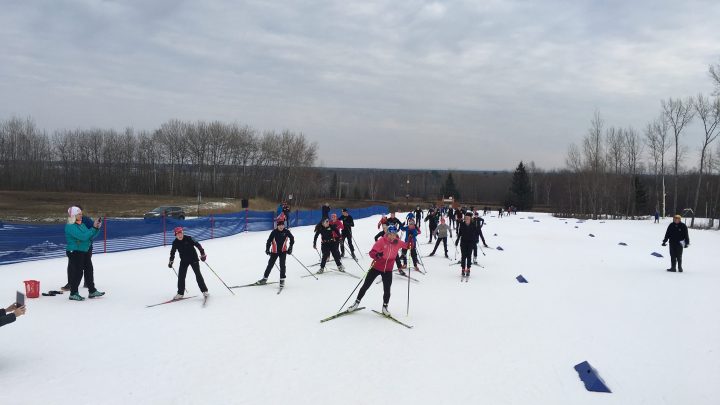
Recreational trails are seen as an economic boon

In mid-November, Olympic cross-country skiing gold medalist Kikkan Randall stood on a ski track in Duluth, Minnesota, surrounded by dozens of brightly clad young skiers.
“You ready to have some fun?” she asked. They responded with an affirmative whoop, and followed Randall as she swooped down hills. The scene made Kari Hedin and Annalisa Peterson, former board presidents of the Duluth Cross Country Ski Club, want to pinch themselves.
“It’s like seeing the thing we thought was not possible,” said Peterson.
Nearly a decade ago, facing warmer winters and increasingly inconsistent snowfall, the club first approached the city about building a trail with the capacity to make artificial snow.
But the initial estimate for the electrical and plumbing infrastructure needed for a trail like that came in at nearly $2 million. The city challenged the club to raise $250,000 to help pay for it.
“And we thought that was ridiculous,” recalled Peterson. “We thought there was no way we could do that. In part it was a philosophical shift, the club had never done anything like that.”
But they succeeded, and last winter the first phase of the Grand Avenue Nordic Center opened at the base of the Spirit Mountain alpine ski area. Over time, though, the estimated cost to finish the project doubled. The final tally is now about $4 million.
The club has steadily ramped up its fundraising goals, bringing in Olympic medallists to stoke excitement and nudge local skiers to open their checkbooks.
“I think we had to get over our ‘Minnesota Nice’ a little bit,” said Peterson. “None of us are comfortable asking the people that we know for money.”
But, time and again, people have donated. Kikkan Randall’s visit alone generated more than $150,000. In less than five years, the club has raised over $800,000 to build the trail and infrastructure for snowmaking and lighting.

A similar story has played out around Duluth, where clubs have raised money to build biking and horseback riding trails, even an ice climbing park.
Around the country, more volunteer organizations are helping to boost recreation infrastructure.
“It certainly gets the attention of local leaders when the small nonprofits come to the table with some skin in the game,” said Dave Wiens, director of the International Mountain Biking Association.
Local fundraising, he said, has helped build extensive trail systems around the country, from Alabama to Nevada.
In the past those efforts would typically originate with volunteer groups. But increasingly, he said, cities are approaching mountain bikers about building trails to promote tourism, or as a way to help local employers attract and retain talent.
“In other words, it’s not just the mountain bikers, anymore, who are looking for the trails, or the trail users,” said Wiens. “It’s municipal leaders who may not ride a mountain bike at all but are connecting the dots between what trails can bring a community.”
Former Duluth Mayor Don Ness is one of those politicians who chooses not to whip down a twisty trail on a mountain bike. But after the 2008 recession, when a local club approached Ness with a vision to build a 104-mile single-track trail, the Traverse, he supported the idea. With one caveat.
“It has to be driven by the people who are most passionate about it,” he said. “Allow them to take ownership of it.”
The city initially pledged to contribute $100,000 annually from its parks fund. But Ness told the club it would have to raise additional funding. In Duluth, it costs about $45,000 to build one mile of trail.
Since then, the group has raised more than $1 million to build nearly 90 miles of bike trails. That’s supplemented more than $2 million in local, state and federal funding.
IMBA’s Wiens said Duluth has become a model for other cities nationwide seeking to build similar projects.
There’s a lot happening in the world. Through it all, Marketplace is here for you.
You rely on Marketplace to break down the world’s events and tell you how it affects you in a fact-based, approachable way. We rely on your financial support to keep making that possible.
Your donation today powers the independent journalism that you rely on. For just $5/month, you can help sustain Marketplace so we can keep reporting on the things that matter to you.












